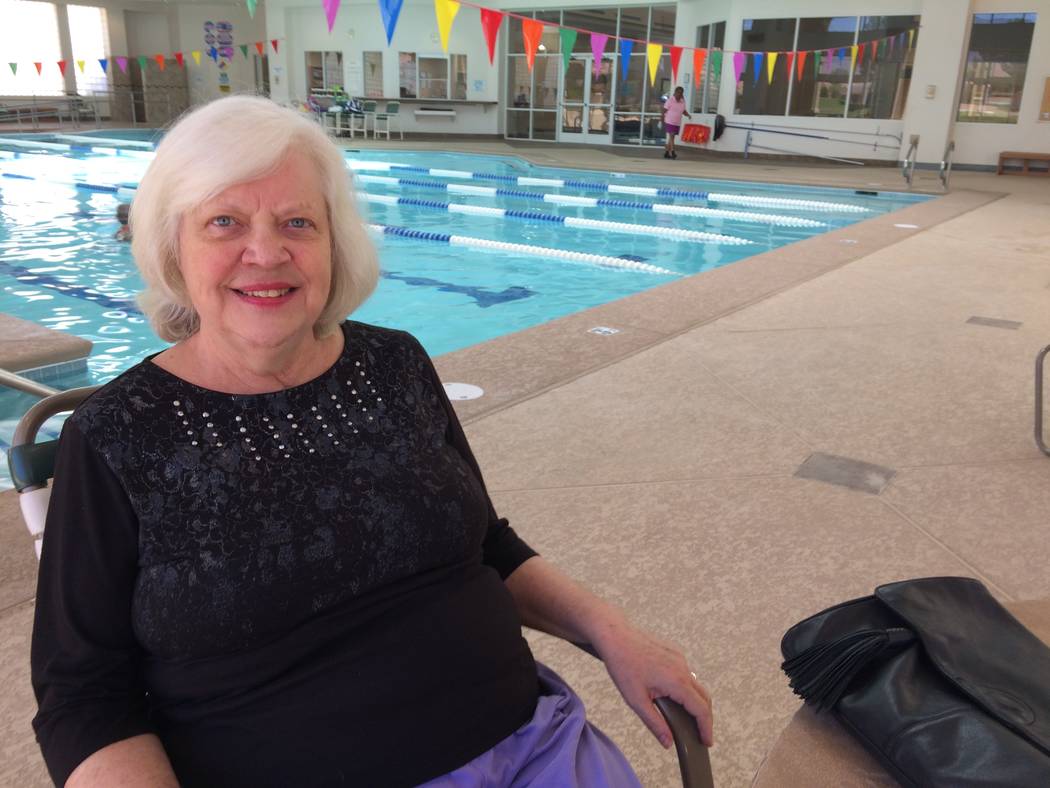Sun City woman warns of infection risk at pools
Days after Rio cleared its water system of Legionnaires’ disease, a woman said she suspects she acquired an infection at a different hot tub.
Retiree Cheryl Hoerr (pronounced hair) has been a swimmer most of her life. She takes to the water for an hour roughly twice a week and said she acquired a urinary tract infection as well as cellulitis in mid-May; she suspects it occurred at a community pool in the northwest valley. View’s attempts to reach that pool operator were unsuccessful.
“After you swim, that’s what everybody does, you go in the Jacuzzi for 10 minutes to relax,” the Sun City Summerlin said.
The Mayo Clinic site notes that cellulitis is a bacterial infection that affects tissues beneath the skin. Common culprits are staphylococcus and streptococcus, although other types of bacteria can cause the condition. Cellulitis must be treated as soon as possible, as it can spread rapidly through one’s body.
“They are abscesses and it’s a very deep infection and very, very painful,” Hoerr said. “For two weeks, I couldn’t do anything. … I went to urgent care twice and the doctors told me I should be in the hospital.”
Not a fan of hospitals, she opted for shots of antibiotics.
Joe Iser, chief health officer of the Southern Nevada Health District, said the pathogens are spread by ingesting or breathing in, or the body being immersed in a contaminated pool or spa. Common pathogens include cryptosporidium, giardia, shigella, norovirus and E. coli. All have a range of symptoms including diarrhea.
Facilities use chemicals so the water is pristine when the doors open each morning, but what about pools and hot tubs that see a plethora of people all day?
Chlorine can kill the germs that cause these recreational water illnesses, but the amount of time it takes to achieve that varies. If a pool is maintained with the correct pH chlorine levels, most germs are killed in less than one hour. However, crypto (short for cryptosporidium), one of the most resistant diseases, survives for days even if a pool is properly maintained.
Crypto is a parasite that spreads through the feces of an infected person. The Centers for Disease Control and Prevention reports that the average person will have roughly 0.14 gram of feces on their behinds, the reason swimmers are asked to rinse off before entering a pool.
In 2016, the CDC received notification of 32 crypto outbreaks nationwide, linked to swimming pools or water play areas — double the amount of reports it received in 2014.
Nevada Revised Statutes 439.200 and 444.070 address spa equipment and water standards, which include normal chlorination levels at 1 to 5 parts per million (1 to 5 mg/l) of free chlorine with a pH level of 7-8.
Spas are kept a higher temperature and contain less water, both factors that can burn off chlorine faster. Therefore, water in a spa has to be turned over at a higher rate, with the entire volume of spa water being filtrated every 30 minutes to combat RWIs. For pools, the rate is once every six hours.
CDC says organisms found in hot tubs can cause rashes, hepatitis, urinary tract infections, digestive tract issues and Legionnaires’ disease (a form of pneumonia).
Brianna Barber is the branch executive director for Durango Hills YMCA, 3521 N. Durango Drive, which has a seasonal pool open through Labor Day. (Hoerr did not swim at the Y pool.) She said the property is required by the Southern Nevada Health District to have a certified pool operator at each of its four facilities during pool hours.
“The pool operator checks the PH and chlorine on an hourly basis to maintain a balanced pool,” she said. “We also check the bather load regularly as this can affect the chemical make-up of the water chemistry.”
The YMCA can see anywhere from 300-500 members daily. The pool is vacuumed twice a week — more if needed.
“The safety of our members and patrons is our No. 1 priority,” Barber said. “We want our members to be healthier and feel stronger because of their participation at the Y. In order for the Y to achieve this, it is imperative that our facility maintenance and cleanliness is held to the highest standard.”
One RWI is so common, it has a nickname: hot tub rash. The scientific name is pseudomonas dermatitis, and it presents as red spots that itch and pus-filled blisters. The rash usually clears up on its own in a few days. If it persists, medical attention is suggested. There is also hot tub lung caused by the steam and bursting bubbles that can disperse bacteria into the air.
The CDC recommends that if you wear contact lenses, you take them out before getting into a hot tub. If not, acanthamoeba keratitis can occur. It is rare, but serious, as it can result in blindness. It’s caused by an organism highly resistant to chlorine.
“If you’ve got a number of people swimming in a pool from 7 a.m. till 9 at night, you’re going to have a problem,” Hoerr said.
Contact Jan Hogan at jhogan@reviewjournal.com or 702-387-2949.
Safety advice
Following are standards to follow when maintaining pool and hot tub chemical levels:
Check the hot tub free chlorine level, done with a simple test strip and drops of chemicals. It should read 2-4 parts per million (PPM) and have a bromine level of 4-6 ppm. The pH level should be 7.2-7.8.
When visiting public or private pools, do your own inspection to avoid the most common health problems. Bring a test strip (found at most superstores or pool-supply stores) to check the pH and free chlorine or bromine concentration levels. CDC recommends:
• Free chlorine should be at least 1 ppm in swimming pools.
• Free bromine concentration needs to be no lower than 3 ppm in swimming pools and at least 4 ppm in the hot tub.
• pH levels need to be between 7.2 and 7.8.
If you find issues, don't go in the water. Inform someone in charge. Visit www.cdc.gov/healthywater/swimming.
Centers for Disease Control and Prevention





























